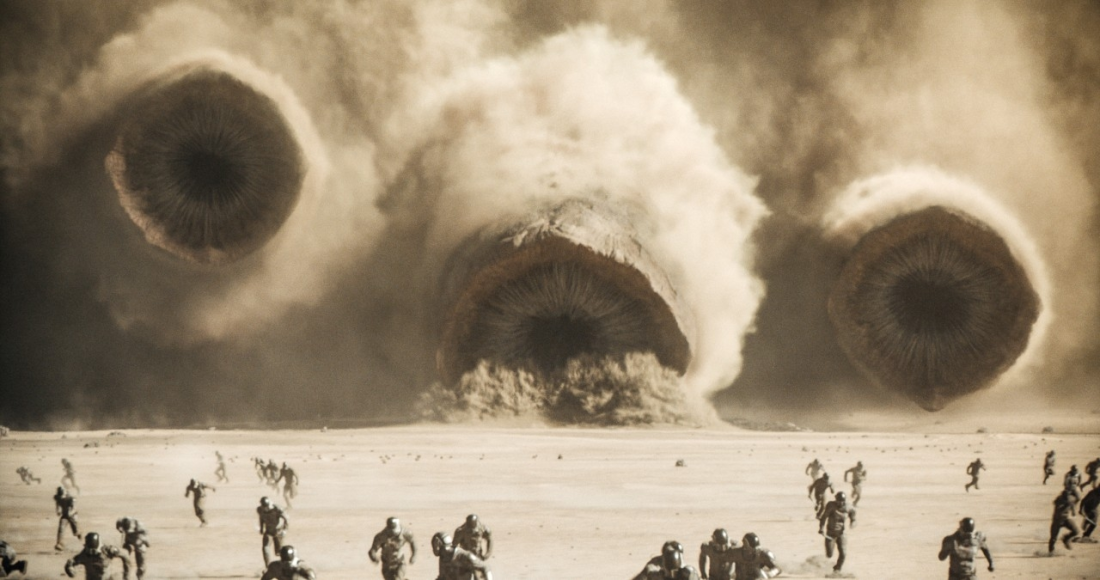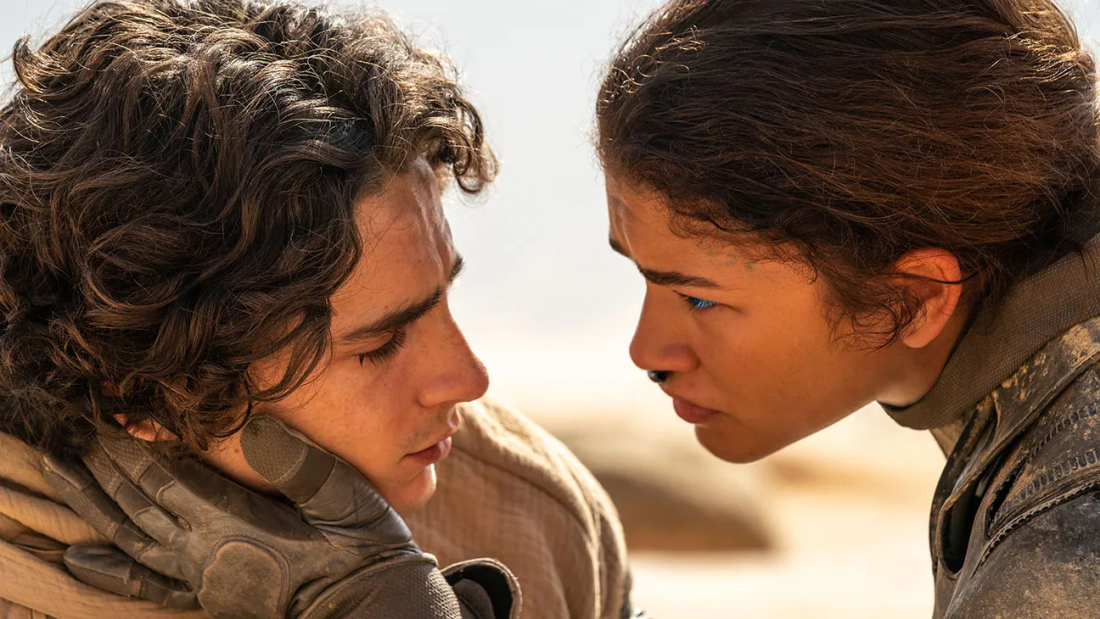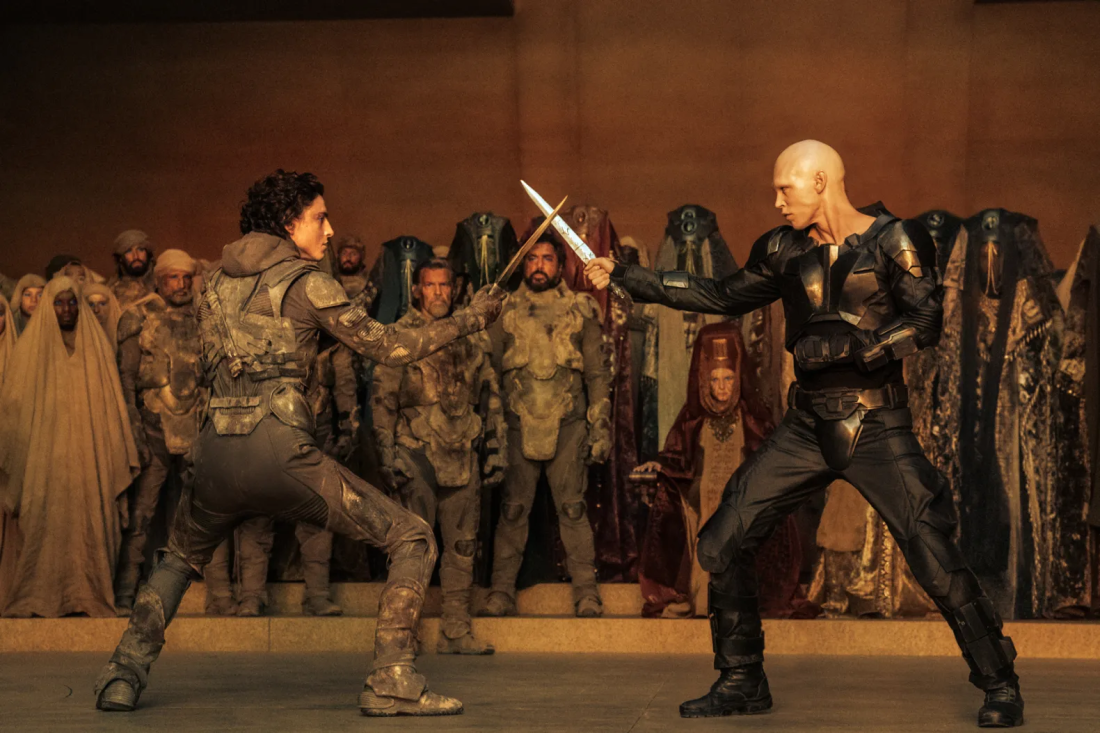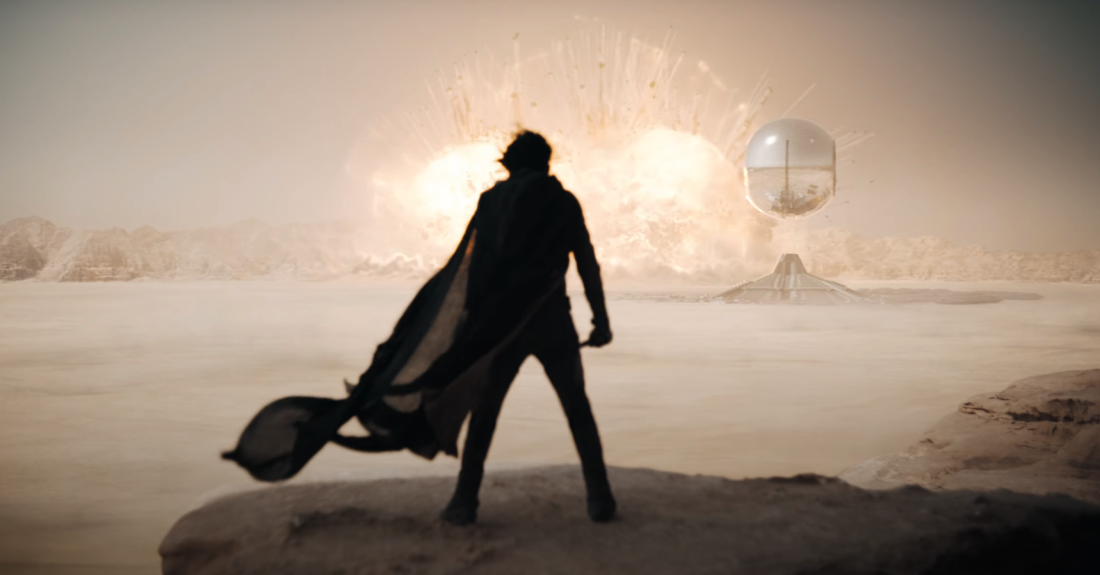Dune: Part 2 (2024) is a sci-fi action epic film from filmmaker Denis Villeneuve. It continues the story of Paul Atreides, living in exile among the Fremen on the desert planet Arrakis, who leads the nomadic people into open revolt against the harsh Harkkonen regime. The film was delayed from its original 2023 release date and will hit theaters worldwide this Friday. Is it a worthy successor to the first installment, and does it adhere faithfully to the source material?
**SPOILERS AHEAD!!**

I have been excited for this film ever since the first part was announced many years ago. As a huge fan of the novel, I knew that while Part 1 would feature a lot of set-up and exposition, Part 2 was when the story REALLY kicks into high gear. I was worried, however, that they wouldn’t manage to depict the nuances of the story on screen like Frank Herbert was able to do in the book, as evidenced by the unwieldy 1984 David Lynch adaptation. The books get VERY weird and philosophical, earning the reputation of being “unfilmable” for good reason. But man oh man, Denis Villeneuve fucking did it: he took the unfilmable and created a masterpiece out of it. Dune: Part Two grapples with heady ideas and weighty themes of power and corruption, and does them all justice with one of the finest and most thought-provoking action epics of our time. It is one of the best movies I have seen in quite some time.
Part 1 of Dune sees Paul grapple with visions of a “holy war” in his name, causing him to fear the power he wields among the Fremen people. He continues to grapple with such visions throughout Part 2, knowing that if he continues down the path laid out for him by his mother and the Bene Gesserit, he would very likely trigger the suffering and even death of billions throughout the universe. He is resistant to take power, which unfortunately has the opposite effect as intended as it causes those around him to respect him even more for his humility. At the outset, all he wants is peace and safety among their people, content to learn their ways and antagonize the Harkkonens from afar. But as his mother, Gurney Halleck, and the Fremen urge him to go further and assume his “rightful” place as leader against the oppressive regime, he is increasingly torn about what path he ought to take and whether the ends justify the means.

The second half of the adaptation delves more deeply into religion and philosophy than the first, fashioning Paul as a cult leader of sorts and highlighting the dangers of inserting religious fanaticism into an already-perilous political situation. Paul fears the fundamentalist Fremen in the deep south of Arrakis, who are much more susceptible to manipulation and more willing to accept the arrival of a messianic figure to deliver them from hardship. The character of Stilgar becomes something of a comic relief character, frequently trying to convince his fellow Fremen that Paul is the messiah, no matter how much of a stretch it seems to be. My theater audience was laughing at him a lot, whereas I was disturbed by the tragedy of his story and how easily he was swayed by his religious convictions. Paul is only able to seize power by stepping into a pre-programmed role meant to control the minds of the oppressed, and despite his misgivings, it becomes trivial for him to take control once he decides to assume his “destiny” and harness the Fremen as a weapon against those who wronged him.
The film departs from the novel in several significant ways, and almost all of them are for the best in my opinion. The most obvious is the removal of the multi-year time skip, allowing events to unfold as though in a single sequence rather than over a prolonged stretch of time. That removes the need to cast a child as Alia and somehow make that character work, since she remains in the womb the whole time, and also lends more immediacy to the narrative. Chani and Jessica’s arcs are also much different in the film; Chani is more skeptical and suspicious of Paul in the movie, whereas Jessica is more active in her quest to fashion her son as the prophesized messiah and fan the flames of religious fanaticism in his name. While the book sees them as allies in the end, the movie sets them apart, as Chani blames Jessica for twisting Paul into the monster he becomes. She ends up leaving at the end of the film, disillusioned by what he has turned into, and that is much more impactful than the “clean” ending the book provides and sets up additional conflict if and when Dune: Messiah comes along in the future.

Ultimately, this is a film about how easily our emotions can control and overcome us to dictate our decision-making, especially for those in positions of power. There is a significant callback in this film to the “pain box” that Paul is forced to endure by the Reverend Mother, proving that he is capable of overcoming his primal instincts in dire circumstances. The tragedy of Paul Atreides is that he does indeed succumb to such emotional instinct, as Feyd-Rautha’s bombing of the Sietch Tabr triggers him to finally seek revenge against the Harkkonens and fulfill the prophecy of the Kwisatz Haderach. Similarly, Jessica’s love for Paul (and her unborn daughter) and the desire to keep them safe leads her down a dark path of her own, fashioning Paul as this cult leader and fanning the flames of fanaticism to use the Fremen’s zealotry as a weapon for her own gain. The film makes it much more clear than the book that they are the villains in this story, as we watch through Chani’s helpless eyes as the man she loves becomes the very thing he swore to defeat in the name of power and vengeance.
In addition to the film’s weighty philosophical themes, it is also a spectacular action blockbuster epic, with some of the finest visuals put to screen in some time. There are several jaw-dropping sequences throughout the film: Paul riding Shai-Hulud for the first time, the sabotage of the spice harvesters, Paul recruiting the southern fundamentalists with an epic speech, and of course the final battle sequence when they attack the Emperor’s forces head-on. Every element of the production is absolutely stunning: the set design, cinematography, costumes, VFX, sound, and of course the magnificent Hans Zimmer score – all of which I could see this film winning at next year’s Oscars. And we must also talk about the great ensemble cast: Timothee Chalamet gives us all of what we’ve come to expect and love from him with a terrific, terrifying performance as a corrupted leader. Zendaya is the heart and soul of the film, the new anchor and moral lens for the audience to judge Paul through, whereas Rebecca Ferguson is a force of nature as Paul’s mother and hype-man. Austin Butler is terrifying as the villainous Feyd-Rautha, but the real MVP for me is Javier Bardem as Stilgar – a humorous but ultimately tragic figure, embodying the pitfalls of playing into religious fervor to attract followers (an especially relevant theme that will only continue to age well as this contentious election year goes on).

Conclusion
Dune: Part Two heralds the arrival of the next great cinematic franchise, standing toe-to-toe with the likes of Lord of the Rings, Star Wars, and even The Godfather as a thought-provoking and engaging story of power and warfare. It takes a beloved hero and twists him into a murderous villain before our very eyes, and makes us understand how and why he became the way he did and the dangers of following the path he chose. It’s all that AND an exciting action blockbuster, and I cannot believe that Denis Villeneuve pulled it off as well as he did. The man has yet to miss after a decade of banger after banger, and dare I say he might have just made his magnum opus. What a phenomenal film!
VERDICT: A+
All image rights belong to Warner Bros. Pictures.
Thanks for reading! Incredibly, we STILL have an Oscars ceremony ahead of us for last year’s movies, so check back next week for my official final winner predictions! Will Dune: Part Two end up crashing the party at next year’s ceremony? We’ll have to wait a while before learning the answer to that one!
-Austin Daniel